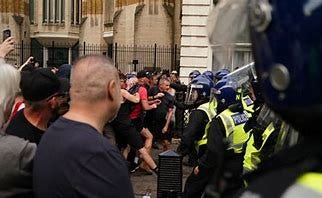The violent racism we have witnessed in various cities in England and Northern Ireland over this weekend is not a sudden occurrence, but rather the culmination of long-standing prejudices that have been "simmering under the surface" of British society. This suggests a deep-rooted problem that has been largely ignored or downplayed. While overt racism may have been less visible in recent years, discriminatory attitudes and behaviours have continued to exist, albeit in more subtle or normalised forms. This "normalised racism" refers to prejudiced views or actions that have become so commonplace that they're often overlooked or considered acceptable by many in society. This normalisation, coupled with specific prejudices against Muslims (Islamophobia), has created an environment where more extreme or violent expressions of racism could emerge. Therefore, current events are not anomalies, but rather the predictable outcome of allowing these attitudes to persist unchallenged over time. Given that recent events are a "direct result" of this long-term problem, there is an obvious need to address not just the immediate incidents, but also the broader societal context that has allowed such prejudices to fester and grow.
The Politicians and the Media
I contend that politicians and the British media have played a significant role in enabling and perpetuating racism and Islamophobia in the UK. This therefore is a systemic issue where those in positions of power and influence have either actively promoted or passively allowed prejudiced views to persist and spread.
The politicians particularly those of the Conservative, UKIP, Reform UK and Labour parties, have embraced dog whistle politics that involves using divisive rhetoric in speeches or campaigns. Nowhere is this more apparent than in the recently concluded General Election. The creation of a “Hostile Environment” by Theresa May’s Tory Government is a clear example of a policy that disproportionately affects minority communities and resoundingly failed to adequately address or condemn racist incidents. Instead, the Tory and now Labour governments has sought to whitewash racism in this country by the publication of reports like the 2021 Sewell Report that enabled Downing Street to conclude, “the UK "no longer" has a system rigged against people from ethnic minorities.” This in turn allowed Government to deprioritise anti-racism initiatives and legislation.
The media has enabled these developments in that we have all been subject to:
1. Biased or sensationalised reporting on issues related to race or religion
2. Underrepresentation or misrepresentation of minority groups in media coverage
3. Providing platforms for individuals or groups expressing racist views
4. Failing to critically examine or challenge racist narratives
The use of the word "enabled" implies that these institutions may not always be directly promoting racism, but their actions (or lack thereof) have created an environment where such views can flourish. This points to a complex interrelationship between political discourse, media representation, and public opinion in shaping societal attitudes towards race and religion. By highlighting the role of these influential sectors, I am emphasising the need for systemic change and accountability at the highest levels of British society to effectively combat racism and Islamophobia.
Inadequate Leadership
The current government's response to recent violent incidents, particularly that of the Prime Minister and Home Secretary has been inadequate in at least three key ways: First the response fails to centre on Muslim people. There has been no focus on the experiences, needs, and perspectives of Muslim communities who are directly affected by these incidents. In my view this means that the government is not sufficiently engaging with or prioritising the voices of those most impacted by Islamophobia and racist violence.
Second, the government has failed to call out racism. In so doing once again (like previous governments), the government is not accurately naming or addressing the problem. By using terms like "thuggery" instead of "violent racism", the criticism suggests that officials are downplaying the severity and nature of the incidents, potentially to avoid confronting the deeper issues of systemic racism. Third and perhaps most importantly, one cannot leave a large swathe of White working-class people behind, depress their wages, increase their precarity as has been done to the White working-class north of the Watford Gap for the last 40 years. In such circumstances people become easy canon fodder for sinister forces wishing to destabilise society for their own narrow gain.
Calling people thugs, threats of harsh sentences in no way acknowledges the full scope and seriousness of the problem. It fails to provide proper support and reassurance to affected communities and misses an opportunity to educate the public about the realities of racism and Islamophobia. There needs to be direct engagement with and support for Muslim communities, Black people, other minorities and the White working-class.
Further there needs to be clear and unequivocal condemnation of racism and Islamophobia and a recognition of these incidents as part of a broader pattern of systemic racism rather than isolated events.
Stop Whitewashing Racism
What is needed is a far more comprehensive and root-cause focused approach to addressing far-right extremism and racism. Current strategies are too narrow and superficial, particularly in two areas:
1. Tackling online misinformation:
It is true that online spaces can be breeding grounds for extremist ideologies but simply addressing misinformation is insufficient. Focusing solely on false information overlooks the deeper societal issues that make people susceptible to extremist narratives in the first place.
2. Increased police surveillance:
Ramping up surveillance is not an adequate solution. It is reactive rather than preventative, and potentially risks infringing on civil liberties without addressing the underlying causes of extremism.
The Government needs to stop whitewashing racism and challenge the social and economic conditions that embolden the far right. This means addressing socio-economic factors, educational gaps, and cultural divides that contribute to the rise of extremist ideologies. Rather than just responding to incidents, we need policies and initiatives that actively work to create a more inclusive and equitable society.
There are systemic issues and instead of commissioning people like Lord Sewell who will provide it with diagnoses and answers that it wants to hear the government needs to appoint people who will examine our institutions and reform them when necessary. As an educator, I would like the government to promote education and dialogue. There needs to be an emphasis on "challenging conditions" and a need for broader public engagement and education about racism, diversity, and inclusion. Without these steps, efforts to combat far-right extremism and racism will remain superficial and ultimately ineffective. Political leaders need to demonstrate the courage and commitment necessary to tackle these deep-seated issues head-on, rather than resorting to quick fixes or surface-level solutions.
My Hope
In conclusion, the fight against racism in Britain cannot be won through tokenism or the elevation of a select few to positions of prestige. The appointment of a handful of individuals from minority backgrounds to the House of Lords or other elite institutions is a mere smokescreen that fails to address the deep-rooted, systemic racism pervading our society. This strategy of creating a small Brown or Black elite is a form of whitewashing that the majority of us have long rejected. It allows the establishment to claim progress whilst leaving the fundamental structures of racial inequality intact.
True progress demands more than symbolic gestures; it requires a comprehensive overhaul of our institutions, policies, and societal attitudes. We must confront the everyday racism faced by millions, tackle economic disparities, reform education, and challenge media representation. Only by addressing these systemic issues can we hope to create a society where racial equality is more than just a lofty ideal for the privileged few, but a lived reality for all. The time for superficial changes has long passed. We need bold, far-reaching action that dismantles the very foundations of systemic racism and creates genuine opportunities for all members of our diverse communities. We need too, to change the conditions that give rise to a White working class that have no hope for themselves or their children.





